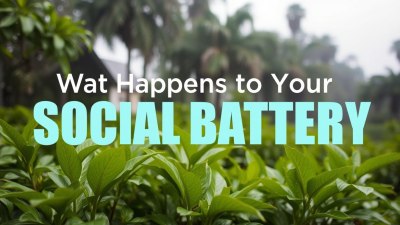What Happens to Your Social Battery in Humid Air
Explore how humid air affects your social energy, mood, and interaction levels with science-backed insights and tips to cope.

Humidity, a measure of how much water vapor is in the air, can influence much more than just our comfort. Many people report feeling drained, irritable, or less motivated to engage socially during humid weather. This article delves into what happens to your social battery in humid air, drawing from physiological, psychological, and environmental factors to explain these effects.
Understanding the Concept of a Social Battery
The term "social battery" refers metaphorically to a person's energy to engage in social interactions. Just like physical energy, social energy can fluctuate daily or even hourly, influenced by internal factors like mood and stress and external factors like environment and social context. When the social battery is full, individuals feel energized, motivated, and enthusiastic about socializing. Conversely, when the battery is depleted, they may experience fatigue, irritability, and a desire to withdraw from social contact.
How Humidity Influences Physical Comfort and Energy
To understand the effects of humid air on your social battery, it's important to first recognize how humidity impacts the body physically. High humidity increases the moisture content in the air, which can impede the body's ability to cool down efficiently through sweating. This can lead to an increase in core body temperature and a sensation of heaviness and lethargy.
The body works harder to maintain homeostasis in humid conditions, which can drain physical energy faster. When physical energy drains, it often translates into a diminished capacity to engage socially, as the body prioritizes conserving resources. The discomfort of sticky, heavy air can also cause irritability, making positive social interactions more challenging.
Neurological and Psychological Mechanisms at Play
Humidity doesn’t just affect the body; it also influences the brain and mood. Studies suggest that weather factors like humidity can affect levels of neurotransmitters including serotonin and dopamine, which regulate mood and social behavior. High humidity can contribute to decreased serotonin levels, leading to feelings of lethargy, sadness, or irritability.
Additionally, discomfort caused by humidity activates the body's stress response. Elevated cortisol levels associated with stress can reduce the brain's ability to process social cues effectively and diminish motivation for social engagement. This physiological response can explain why people often feel more withdrawn or less communicative on humid days.
The Impact of Humidity on Sleep and Social Engagement
Sleep quality directly influences social energy. Humid air, especially when combined with warm temperatures, can disrupt sleep by causing night sweats and discomfort. Poor sleep leads to fatigue, cognitive sluggishness, and mood imbalances, all of which reduce one's social battery.
When individuals don’t sleep well, their ability to maintain patience, empathy, and attention during social interactions decreases. This can result in miscommunications, heightened frustration, and a general reluctance to participate in social activities.
Humidity and Social Motivation: A Complex Relationship
The social battery is not just about energy but also about motivation. Humid air may dampen social motivation because it creates a physiological state that the brain interprets as unpleasant or taxing. The drive to seek out and enjoy social connection often wanes when the body is under physical stress.
Moreover, people might instinctively avoid crowded social settings in humid environments to escape the added discomfort. This behavioral tendency further reduces opportunities to recharge the social battery, creating a cycle of social withdrawal.
How Individual Differences Moderate Humidity Effects
Not everyone responds to humidity in the same way. Factors such as age, fitness level, hydration, and acclimatization can influence how one experiences humid air. For example, people accustomed to living in tropical climates may experience fewer negative effects on their social battery compared to those from drier environments.
Personality traits also play a role. Extroverted individuals might push through the discomfort and social withdrawal, while introverted types may find humid conditions an added reason to avoid socialization. Awareness of these differences can help individuals manage their social energy more effectively during humid weather.
Environmental and Social Context Considerations
Humidity does not act in isolation but interacts with other environmental and social factors. Crowded, poorly ventilated spaces become even more uncomfortable in high humidity, exacerbating the depletion of social energy. Social settings that require high cognitive load, like networking events or parties, can feel overwhelming when combined with physical discomfort.
Conversely, humid air in outdoor natural settings might have a different impact compared to indoor urban environments. Access to air conditioning, hydration options, and breaks in cool environments can mitigate the burdens of high humidity on social energy.
Practical Strategies to Preserve Your Social Battery in Humid Conditions
Although humid air can drain your social battery, there are several strategies to counteract its effects. First, staying well-hydrated is essential, as dehydration often accompanies high humidity and worsens fatigue and irritability.
Maintaining cool body temperature through dressing lightly, using fans or air conditioning, and seeking shade or cooler environments helps reduce physical stress. Practicing good sleep hygiene and using breathable bedding materials can improve rest quality on humid nights.
Scheduling social engagements during cooler parts of the day, such as early morning or late evening, can make interactions more comfortable and sustainable. Taking regular breaks during social events to recharge in air-conditioned or low-humidity spaces can also preserve social energy.
Mindfulness and Psychological Tools
Mindfulness and stress-reduction techniques like deep breathing, meditation, or progressive muscle relaxation can help manage the elevated stress induced by humid conditions. These practices support mood regulation and cognitive clarity, enabling better social engagement despite environmental discomfort.
Setting realistic expectations for social interactions during humid weather can reduce pressure and potential feelings of guilt over social withdrawal. Recognizing the influence of environmental factors on social battery encourages self-compassion and adaptive coping.
Humid Air Effects on Communication Styles
When social batteries run low in humid conditions, communication styles often become more terse or less expressive. People may exhibit reduced eye contact, shorter replies, or increased impatience. Awareness of this tendency can help individuals interpret social cues more kindly and respond with understanding rather than frustration.
Conversely, some people may seek more intimate or one-on-one interactions rather than large group settings when dealing with the discomfort of humidity. Tailoring social environments to fit energy levels during these times can improve overall interaction quality.
Technology’s Role in Managing Social Energy
Technology can mitigate some negative effects of humidity on social batteries. Virtual meetings allow for social interaction without the physical discomfort of humid environments. Mobile apps that monitor weather and humidity levels can help in planning social activities more strategically.
Wearable devices that track physiological data such as heart rate and hydration can provide real-time feedback, enabling proactive management of energy and stress levels. Using technology for remote social connection during high-humidity spells can preserve social energy while maintaining important relationships.
Case Studies and Research Findings
Several studies have documented the relationship between humidity and mood or social behavior. For instance, research published in environmental psychology journals notes a correlation between high humidity and increased reports of discomfort, anxiety, and social withdrawal.
One case study followed office workers in a tropical climate and found decreased social engagement during periods of sustained high humidity, particularly when ventilation was poor. Conversely, environments with good climate control and air circulation saw steadier social energy levels.
Another research project investigating neurotransmitter changes linked to weather fluctuations demonstrated that humidity contributed to decreased serotonin availability, correlating with reduced motivation for socializing.
Exploring Cultural Perspectives on Humidity and Social Behavior
Different cultures have unique social norms and practices influenced by their climates. In regions with consistently high humidity, social activities are often adjusted to accommodate environmental conditions, such as siesta traditions or evening socializing when temperatures and humidity drop.
Understanding these cultural adaptations provides insight into possible strategies for managing social batteries in humid air. It also highlights how humans have evolved behavioral patterns to maintain social cohesion despite environmental challenges.
The Role of Physical Activity and Fitness
Physical fitness can buffer the negative effects of humidity on social energy. Regular physical activity improves cardiovascular efficiency and thermoregulation, allowing individuals to tolerate challenging environmental conditions better.
Engaging in moderate exercise in humid air, with appropriate hydration and pace, can actually enhance mood and social motivation. This counterintuitive benefit occurs because physical activity boosts endorphins and neurotransmitters that improve wellbeing.
Hydration Strategies for Social Energy Maintenance
Hydration is a critical factor in maintaining both physical and social energy. In humid air, the risk of dehydration increases due to sweating and less efficient cooling. Dehydration impairs cognitive functions, mood, and energy—all essential to social engagement.
To preserve the social battery, consume fluids regularly throughout the day, favoring water and electrolyte-rich beverages. Avoid excessive caffeine or alcohol, which can promote dehydration. Carrying a water bottle during social events ensures constant hydration, reducing irritability and fatigue linked to humid conditions.
Indoor Versus Outdoor Humidity Exposure
The effects of humidity on social batteries vary between indoor and outdoor environments. Indoors, air conditioning and humidity control systems can moderate the impact, making social interactions more comfortable. However, crowded indoor spaces with poor ventilation may intensify the discomfort caused by humidity.
Outdoor humid environments often involve exposure to direct sunlight, heat, and other stressors that collectively increase physical fatigue. Planning outdoor social events with shading, misting fans, or during cooler hours can minimize these effects and help maintain social energy.
Recognizing Signs of Social Battery Depletion in Humid Conditions
Being attuned to signs of social battery depletion during humid weather is essential for managing energy. Common symptoms include increased irritability, difficulty concentrating, feelings of overwhelm, decreased interest in conversation, and a desire to retreat from social settings.
Early recognition allows for timely strategies such as taking breaks, hydrating, or temporarily withdrawing to recover energy rather than pushing through exhaustion, which can worsen mood and social performance.
Preparing for Humid Days to Optimize Social Engagement
Preparation is key to maintaining social batteries in humid air. Checking weather forecasts for humidity levels before planning social events enables informed decisions about timing and location. Dressing in breathable, moisture-wicking fabrics aids body temperature regulation.
Adopting a mindset that prioritizes comfort and energy management over social obligations during high humidity days supports healthier social interactions. Informing friends or colleagues about one’s reduced tolerance can foster understanding and flexibility.
Future Research Directions
While existing studies highlight the effects of humidity on mood and social behavior, more comprehensive research is needed to unpack the complex biopsychosocial mechanisms behind these observations. Longitudinal studies and experiments involving diverse populations will deepen understanding of how humidity interacts with individual differences and social contexts.
Innovations in wearable technology and environmental sensors could provide richer data on real-time physiological responses to humidity and their impact on social capacity. Such insights would inform targeted interventions to optimize social batteries across various climates.
In summary, humid air affects your social battery by increasing physical strain, triggering stress responses, reducing sleep quality, and dampening social motivation. Understanding these dynamics and adopting practical strategies can help maintain social energy and improve interpersonal connections even in challenging humidity conditions.











